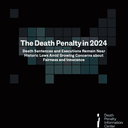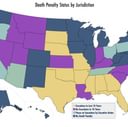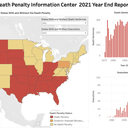FOR IMMEDIATE RELEASE
Thursday, December 13, 2001 CONTACT: BRENDA BOWSER
(202) 293‑6970
bbowser@essential.org
2001 DEATH PENALTY REPORT FINDS 22% DECLINE IN EXECUTIONS, REFORM INITIATIVES GAINING GROUND
Public support drops, new criticisms voiced
as number of death row exonerations nears 100
WASHINGTON, DC — Today’s release of the Death Penalty Information Center’s 2001 Year End Report found a 22% decline in executions, a drop in public support for capital punishment, and a steady stream of successful reform efforts throughout the nation last year. The review also notes that questions of fairness and a growing national concern about the application of the death penalty continue to shape America’s capital punishment debate.
For the first time since the death penalty was reinstated in 1976, the number of executions has declined for two consecutive years and the number of people on death row is declining. A 2001 Gallup Poll found that support for capital punishment has dropped to 65%, 15 percentage points below 1994 findings. Additional polling data released throughout the year reflects the public’s concern that innocent people are being sentenced to death. A majority of Americans now support a moratorium on executions.
“While the past year has been a time of real progress in addressing the problem areas of the death penalty, the crisis continues,” said Richard C. Dieter, DPIC Executive Director. “In 2001, new evidence emerged of a broken system. As Americans have become more familiar with the enormous potential for error in capital cases, they have become less tolerant of state and national policies that risk innocent lives.”
Of the nearly 100 innocent inmates who have been exonerated from death row, five were freed in 2001. The issues raised as a result of these new innocence cases, as well as revelations from state and independent studies showing unfairness in the capital punishment system, caused a number of former proponents of the death penalty to question its value. DPIC’s report notes that Supreme Court Justices Sandra Day O’Connor and Ruth Bader Ginsburg were among those urging a closer scrutiny of capital punishment in 2001.
These same concerns prompted lawmakers in nearly every state retaining the death penalty to consider a variety of reform bills. Five states banned the execution of the mentally retarded, and 17 states acted to provide greater opportunity for post-conviction DNA testing according to DPIC’s report. The review found that other states changed their systems of indigent defense during the year in an attempt to provide better representation.
Even as the country’s attention turned to the tragic events of September 11, international opposition to the death penalty continued to grow. Around the world, the number of countries which have stopped using the death penalty rose to 109, and many world leaders urged the U.S. to reconsider its death penalty policies.
The Death Penalty Information Center is a non-profit organization serving the media and the public with analysis and information on issues concerning capital punishment. The Center was founded in 1990 and serves as a resource to those working on this issue. Today’s Year End report is DPIC’s sixth annual review. In addition to noting important trends in the death penalty, the report contains valuable data on executions, death row populations, and the results of independent reviews around the nation. # # #
Read the 2001 Year End Report



